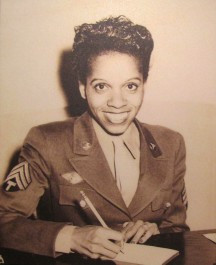Long before Rosa Parks became a household name in the fight for civil rights, and before Martin Luther King Jr.’s powerful speeches echoed across the nation, Edna Griffin was already laying the groundwork for equality in Iowa. Her story, though less widely known, marks her as a true pioneer in the civil rights movement, particularly in the pre-movement era.
Born Edna McKnight on October 23, 1909, in Lexington, Kentucky, Griffin’s early life in rural New Hampshire, where her father worked as a dairy farm supervisor, might seem removed from the burgeoning civil rights struggles of the South. However, her education at Fisk University, a historically Black university in Nashville, Tennessee, in the 1930s, immersed her in a world grappling with racial inequality. It was at Fisk where she not only earned her teaching degree in 1933 but also met her husband, Stanley Griffin. Their move to Des Moines, Iowa, in 1947, for Stanley’s studies at Still College of Osteopathy and Surgery (now Des Moines University), placed Edna Griffin at the center of a new chapter in her fight for equality.
 Edna Griffin in Women's Army Corps uniform at Fort Des Moines, WWII. A civil rights pioneer who served her country.
Edna Griffin in Women's Army Corps uniform at Fort Des Moines, WWII. A civil rights pioneer who served her country.
The Griffins’ decision to settle in the Beaverdale neighborhood of Des Moines, a predominantly white area at the time, was a testament to their resolve. As noted by Mikel Johnson, a friend and former neighbor, this act alone demonstrated “strength of character.” However, it was Edna Griffin’s reaction to a discriminatory incident in the summer of 1948 that truly cemented her legacy as a civil rights pioneer.
On a sweltering July day, Griffin, accompanied by John Bibbs, Leonard Hudson, and her infant daughter Phyllis, sought refuge from the heat at Katz Drug Store in downtown Des Moines. When Griffin attempted to order an ice cream soda, the group was denied service, with the store claiming it was “not equipped to serve colored people.” This blatant act of racial discrimination ignited a fire in Griffin.
Refusing to accept this injustice, Griffin, along with Bibbs and Hudson, who were fellow activists in the Progressive Party of Iowa and dedicated to ending racial discrimination, launched a sustained campaign against Katz Drug Store. For two months, every Saturday, they organized boycotts, sit-ins, and pickets in front of the store located at the corner of Seventh and Locust streets. Their activism aimed to challenge the discriminatory practices prevalent in Des Moines and to demand equal treatment for all.
Beyond direct action, Griffin and her fellow activists pursued legal recourse. In November 1948, they filed charges against Maurice Katz, the store owner, citing the 1884 Iowa Civil Rights Act, which prohibited discrimination in public accommodations. The ensuing criminal trial garnered statewide attention and culminated in a jury finding Katz guilty, with a $50 fine. Katz appealed, but the Iowa Supreme Court upheld the conviction in December 1949, marking a significant legal victory against segregation in Iowa.
Even as the criminal appeal unfolded, Griffin pressed forward, initiating a civil suit in Polk County District Court, seeking $10,000 in damages for the emotional distress and discrimination suffered during the July 1948 incident. Supported by local NAACP Legal Defense Fund members, Griffin’s civil case went before an all-white jury. While the jury awarded her only $1 in damages, her lawyer declared it a “moral victory.” This landmark case effectively dismantled legal segregation at lunch counters, soda fountains, and restaurants across Des Moines, paving the way for broader desegregation efforts in Iowa.
Edna Griffin’s fight extended beyond racial equality. As Mikel Johnson emphasized, she advocated for “civil rights for African-Americans and all people… across all the protected classes.” Her dedication to peace and human rights cemented her status not just as a civil rights pioneer, but as a champion for universal human dignity. Her actions in Des Moines resonate as a powerful reminder that the fight for equality is often waged and won by unsung heroes in local communities, long before national movements take center stage.
